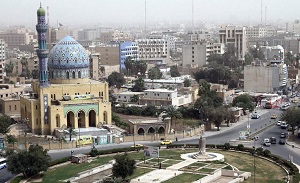Baghdad in Islamic History
 In 634 CE., the newly-created Muslim empire expanded into the region of Iraq, which at the time was part of the Persian Empire. Muslim armies, under the command of Khalid ibn Waleed, moved into the region and defeated the Persians. They offered the mostly-Christian residents two choices: embrace Islam, or pay a jizyah tax to be protected by the new government and excluded from military service.
In 634 CE., the newly-created Muslim empire expanded into the region of Iraq, which at the time was part of the Persian Empire. Muslim armies, under the command of Khalid ibn Waleed, moved into the region and defeated the Persians. They offered the mostly-Christian residents two choices: embrace Islam, or pay a jizyah tax to be protected by the new government and excluded from military service.
The caliph Omar ibn Al-Khattab ordered the foundation of two cities to protect the new territory: Kufah (the new capital of the region) and Basrah (the new port city).
Baghdad only came into importance in later years. The city's roots date back to ancient Babylon, a settlement as far back as 1800 BCE. However, its fame as a center for commerce and scholarship began in the 8th century CE.
Meaning of the Name "Baghdad"
The origin of the name "Baghdad" is under some dispute. Some say it comes from an Aramaic phrase that means "sheep enclosure" (not very poetic . . .). Others contend that the word comes from ancient Persian: "bagh" meaning God, and "dad" meaning gift: "The gift of God...." During at least one point in history, it certainly seemed so.
The Capital of the Muslim World
In about 762 CE, the Abbasid dynasty took over the rule of the vast Muslim world and moved the capital to the newly-founded city of Baghdad. Over the next five centuries, the city would become the world's center of education and culture. This period of glory has become known as the "Golden Age" of Islamic civilization, a time when scholars of the Muslim world made important contributions in both the sciences and humanities: medicine, mathematics, astronomy, chemistry, literature, and more. Under Abbasid rule, Baghdad became a city of museums, hospitals, libraries, and mosques.
Most of the famous Muslim scholars from the 9th to 13th centuries had their educational roots in Baghdad. One of the most famous centers of learning was Bayt al-Hikmah (the House of Wisdom), which attracted scholars from all over the world, from many cultures and religions. Here, teachers and students worked together to translate Greek manuscripts, preserving them for all time. They studied the works of Aristotle, Plato, Hippocrates, Euclid, and Pythagoras. The House of Wisdom was home to, among others, the most famous mathematician of the time: Al-Khawarizmi, the "father" of algebra (this branch of mathematics is actually named after his book "Kitab al-Jabr").
While Europe festered in the Dark Ages, Baghdad was thus at the heart of a vibrant and diverse civilization. It was known as the world's richest and most intellectual city of the time and was second in size only to Constantinople.
After 500 years of rule, however, the Abbasid dynasty slowly began to lose its vitality and relevance over the vast Muslim world. The reasons were partly natural (vast flooding and fires), and partly human-made (rivalry between Shia and Sunni Muslims, internal security problems).
The city of Baghdad was finally trashed by the Mongols in 1258 CE., effectively ending the era of the Abbasids. The Tigris and Euphrates Rivers reportedly ran red with the blood of thousands of scholars (a reported 100,000 of Baghdad's million residents were massacred). Many of the libraries, irrigation canals, and great historical treasures were looted and forever ruined. The city began a long period of decline and became host to numerous wars and battles that continue to this day.
In 1508 Baghdad became part of the new Persian (Iranian) empire, but very quickly the Sunnite Ottoman empire took over the city and held it virtually uninterrupted until World War 1.
Economic prosperity did not begin to return to Baghdad for several hundred years, until the late 19th century as trade with Europe returned in earnest, and in 1920 Baghdad became the capital of the newly formed nation of Iraq. While Baghdad became a thoroughly modern city in the 20th century, constant political and military upheaval has prevented the city from ever returning to its former glory as the center of Islam culture. Intense modernization occurred during the oil boom of the 1970s, but the Persian Gulf War of 1990-1991 and 2003 destroyed much of the city's cultural heritage, and while many of the buildings and infrastructure have been rebuilt, the city has not yet achieved the stability needed to return it to prominence as a center for religious culture.
By Huda
https://www.learnreligions.com/
